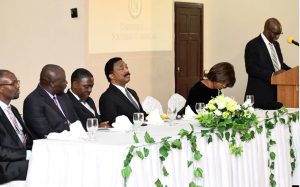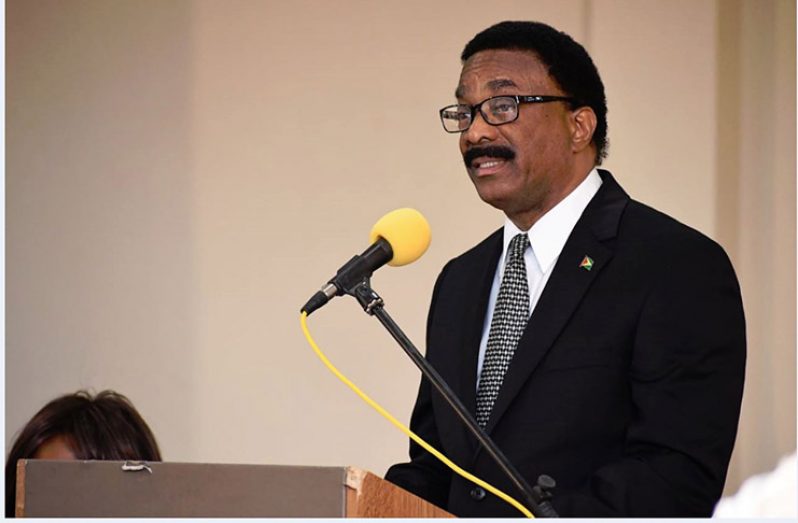– attorney general
By Navendra Seoraj
REGIONAL universities, if they are to survive and compete with some of the larger, international universities, have to cooperate with each other, said Attorney General (AG), Basil Williams.
He believes that competition is needed to raise educational standards but cooperation is necessary to ensure the programmes offered are relevant and suited for the region.
“Regional universities – including the University of Guyana, the University of the West Indies and the University of the Southern Caribbean – should examine avenues for greater cooperation so as to offer courses tailored to our development needs and realities,” said Williams during his remarks at the Indigenous Scholarship Fundraising Gala-Lecture Dinner, hosted by the University of the Southern Caribbean, at the Princess Ramada Hotel.
He urged regional providers of higher education to explore avenues of cooperation so as to ensure that the programmes they offer remain accessible, affordable and appropriate, and are delivered with greater agility.
Higher education is now vital to ensuring that the Caribbean acquires the human resources needed for competitive economies, cohesive societies and inclusive democracies, the attorney general said.
“Providers of higher educational services, however, face the challenges of fiscal constraints, higher costs, difficulties in attracting and retaining quality staff and increased competition from external distance and Open Education programmes,” said Williams.
Higher education, in the Caribbean, faces many constraints. Competition for scarce fiscal resources often means that governments cannot devote as much resources as they would like towards higher education.
HIGH COSTS

In addition, Williams said the high costs of higher education deter and even discriminate against students of limited means.
“The ability to attract and retain quality staff is dependent on the ability to offer competitive emoluments which often places great demands on the slender budgets of regional universities.
“And then there is the competition from external universities which are utilising technological platforms to offer a wider range and cheaper and more flexible programmes to our students,” Williams said.
Technology is transforming the delivery of education. The use of smart classrooms, multimedia resources, digital libraries, e-tutors and computer software is revolutionising the dissemination of information.
The attorney general said education and Open Education are making higher educational programmes more accessible to ordinary citizens. Technology has created the concept of the ‘virtual classroom’ in which students are no longer required to be physically present at one location for lectures and even examinations.
These new platforms have allowed for the provision of mass educational services across geographic boundaries. Students in one country are able to undertake courses of study in foreign universities without having to leave their homes.
Williams said thousands of students are now able to enroll in Distance Education and Open Education programmes.
He, however, believes the downside for the Caribbean is that those developments can result in greater penetration by foreign universities into the region and the undermining of the competitiveness of regional educational services.
“In the context of these constraints – fiscal, high costs, limitations in attracting quality staff and the growth and penetration of online and distance learning – the need arises for regional universities to become more agile in the delivery of educational services,” Williams said.
It has long been recognised that higher education in the Caribbean has to be accorded greater priority in order for the region to overcome its challenges.
President David Granger, speaking at the opening of the University of the West Indies South Campus of St. Augustine in Penal-Debe, Trinidad and Tobago on July 31, 2015, argued for the region to embrace a new paradigm in higher education.
EMBRACE TECHNOLOGICAL CHANGE
In that regard, Williams said in response to the existing challenges, regional universities should continue to embrace technological change in education and ensure that there is greater access, affordability, appropriateness and agility in the provision of higher educational services.
He said a good response to the challenges is the Open Campus initiative of the University of the West Indies and the distance programmes offered by the University of the Southern Caribbean.
Guyana will soon also be taking steps to improve the delivery of education, especially when government launches the “Decade of Development” next year.
Williams said the decade will ensure that quality education is delivered and guarantee the constitutional right of free education from nursery to university.
President Granger had announced that the revenues from the production of oil and gas will be directed, inter alia, towards the restoration of free university education.
“However, we have not waited on these revenues to ensure that persons have access to higher education.
“The Government of Guyana has provided scholarships to many persons and recently offered full scholarships for a limited number of law students to pursue legal education at the Hugh Wooding Law School. We understand. It is one of the measures deployed to increase access to higher education,” said Williams.
The provision of university education is not cheap. And it is for this reason that the government congratulated the University of the Southern Caribbean for establishing the ‘Indigenous Scholarship’.
The scholarship paves the way for Guyanese to realise their dreams and improve human resources.
“Those who choose to invest in this programme will be investing in the future of Guyana. You who have already contributed to the scholarship fund you have ensured, through your generosity, that Guyana is left in good hands,” said the attorney general.



.jpg)









